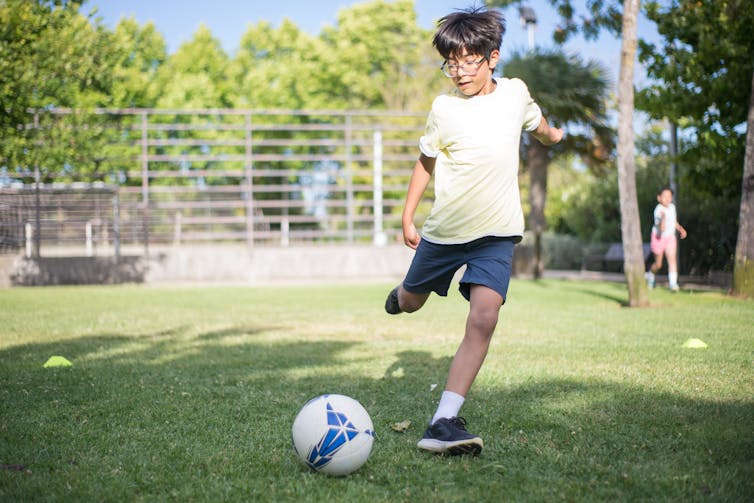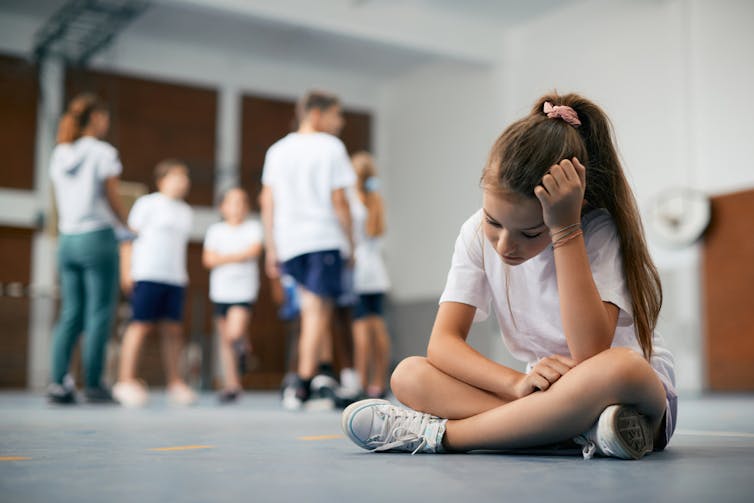Sarah Jefferson, Edith Cowan University
Grit. Don’t quit.
That’s the mantra many parents may have in mind when they, like me, spend what feels like years ferrying children to a seemingly endless variety of sports and activities. From enduring sheets of almost vertical icy rain while cheering them on a hockey pitch, to obscenely early morning starts for rowing, I can happily say my own grit and resilience has been tested to its upper limits. But what about the children’s?
When it comes to grit, resilience and kids sport, the question around their enrolment, ongoing participation and right to quit is often the topic of much conversation – and consternation. As parents, what should we do when kids announce, often mid-season, they want to “take a break” or quit altogether?
As a parent and educator this raises the question of that invisible line we often tread about how much to push them, when to let them take a break and when it’s OK to just let them quit.

Photo by Kampus Production/Pexels, CC BY
Grit matters
More than mere buzzwords, the terms grit and resilience have themselves been the subject of extensive research. US-based researcher Angela Duckworth has defined grit as “perseverance and passion for long-term goal”, saying it involves
working strenuously towards challenged, maintaining effort and interest over years despite failure, adversity, and plateaus in progress.
Grit has been associated with growth mindset, satisfaction and a sense of belonging.
One US study found
perseverance of effort predicted greater academic adjustment, college grade point average, college satisfaction, sense of belonging, faculty–student interactions, and intent to persist, while it was inversely related to intent to change majors.
A study of children coping with reading disorders found
strong evidence that grit and resilience is significantly related to mental health, academic success, and quality of life.
Duckworth suggests resilience is a component of grit but there are other models, too.
For instance, Special Air Service Regiment (SAS) veterans Dan Pronk, Ben Pronk and Tim Curtis (authors of the book, The Resilience Shield) propose groups of resilience factors as a series “layers” (such as a professional layer, a social layer, an adaptation layer) which interact with each other. They note the challenge of defining resilience, referring to it as “an outcome better than expected given the adversity being faced”.

Shutterstock
Giving grit a chance to grow
As adults, perhaps we can reflect on experiences we’ve had in life that have helped build our resilience. But kids and adolescents are still developing grit and the ability to work strenuously towards a goal. Their brains are undergoing significant developmental changes.
My research has a focus on teacher education and what helps teachers stick with a career that can occasionally be extremely challenging.
Learning to help children and adolescents navigate challenging situations and being able to cultivate your own resilience in the face of trying circumstances is a crucial skill for teachers.

Shutterstock
So how do we handle those difficult conversations when kids announce they want to quit a sport or activity?
Firstly, remain neutral and check the temperature of the conversation. Is this a heat-of-the-moment conversation? Right after a big loss or a less-than-stellar piano recital? Good decisions are not usually made in those moments.
Talk to the coach or tutor to figure out what may really be going on. Sometimes the problem can be peer related and again, it is important for kids to learn to navigate those challenges.
All told, when kids announce they want to quit, keep the dialogue open. Listen carefully when they explain their reasons, but talk to your children about grit, too.
Share with them research that compares a growth mindset (which teaches that even when things get hard, we can learn and grow and get better) with a fixed mindset (which posits that either you’re good at something or not and there’s little room to change). Research suggests having a growth mindset can foster persistence and positive long-term outcomes.
The key is that parents don’t teach resilience to children just by telling them about it. It is truly built through experience.![]()
Sarah Jefferson, Lecturer in Education, Edith Cowan University
This article is republished from The Conversation under a Creative Commons license. Read the original article.


Recent Comments